International Trade Law: Barney Ltd. vs. Sally Ltd. Analysis
VerifiedAdded on 2022/12/15
|8
|3274
|85
Report
AI Summary
This report provides an analysis of an international trade law case involving a CIF (Cost, Insurance, and Freight) contract between Barney Ltd. and Sally Ltd. The assignment addresses several key legal issues, including the validity of rejecting bills of lading due to date manipulation, moisture content discrepancies, and quantity variations. It examines the application of the Hague Visby Rules and the UCP 600 (Uniform Customs and Practice for Documentary Credits) in relation to the letter of credit. The analysis delves into the role of the bank in documentary credit transactions, focusing on the rejection of documents due to discrepancies and the bank's obligations. The report also considers the interpretation of contract terms, specifically the difference between "Greek oil" and "Greek virgin olive oil." It supports its arguments with relevant case law, legislations, and scholarly articles, providing a comprehensive examination of the legal principles involved in international trade transactions, including the rights and obligations of the parties involved and the application of relevant international trade law instruments.
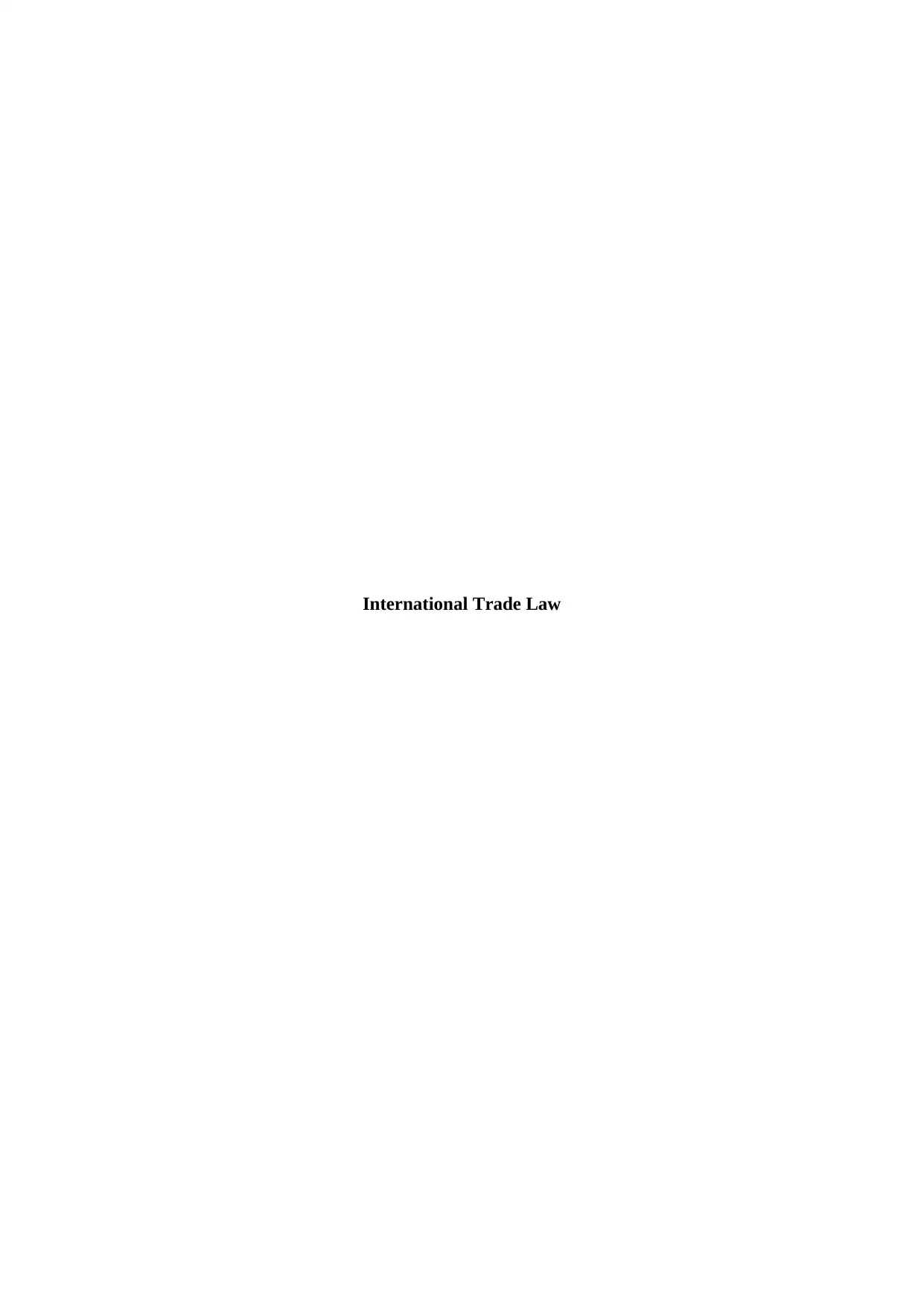
International Trade Law
Paraphrase This Document
Need a fresh take? Get an instant paraphrase of this document with our AI Paraphraser
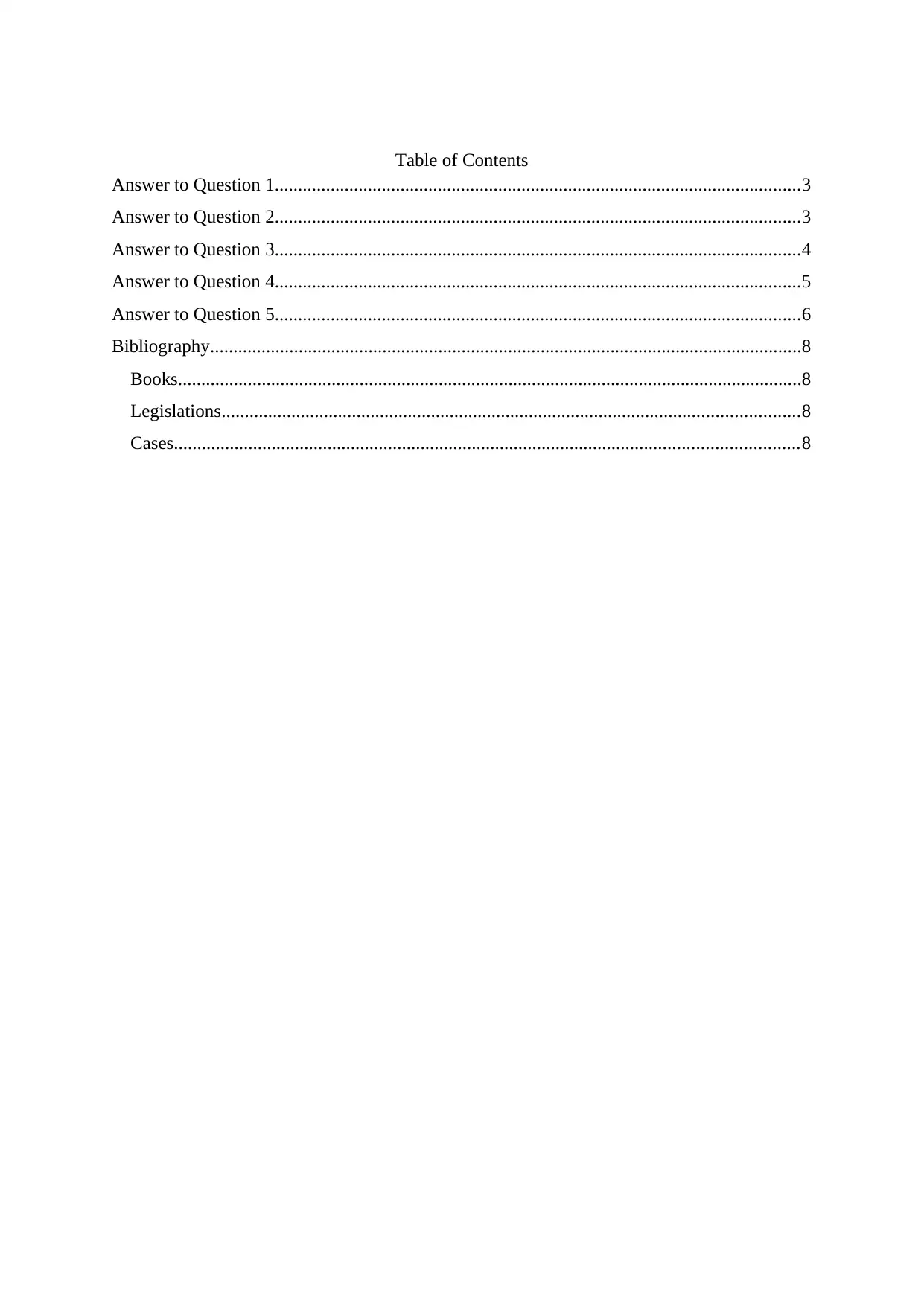
Table of Contents
Answer to Question 1.................................................................................................................3
Answer to Question 2.................................................................................................................3
Answer to Question 3.................................................................................................................4
Answer to Question 4.................................................................................................................5
Answer to Question 5.................................................................................................................6
Bibliography...............................................................................................................................8
Books......................................................................................................................................8
Legislations............................................................................................................................8
Cases......................................................................................................................................8
Answer to Question 1.................................................................................................................3
Answer to Question 2.................................................................................................................3
Answer to Question 3.................................................................................................................4
Answer to Question 4.................................................................................................................5
Answer to Question 5.................................................................................................................6
Bibliography...............................................................................................................................8
Books......................................................................................................................................8
Legislations............................................................................................................................8
Cases......................................................................................................................................8
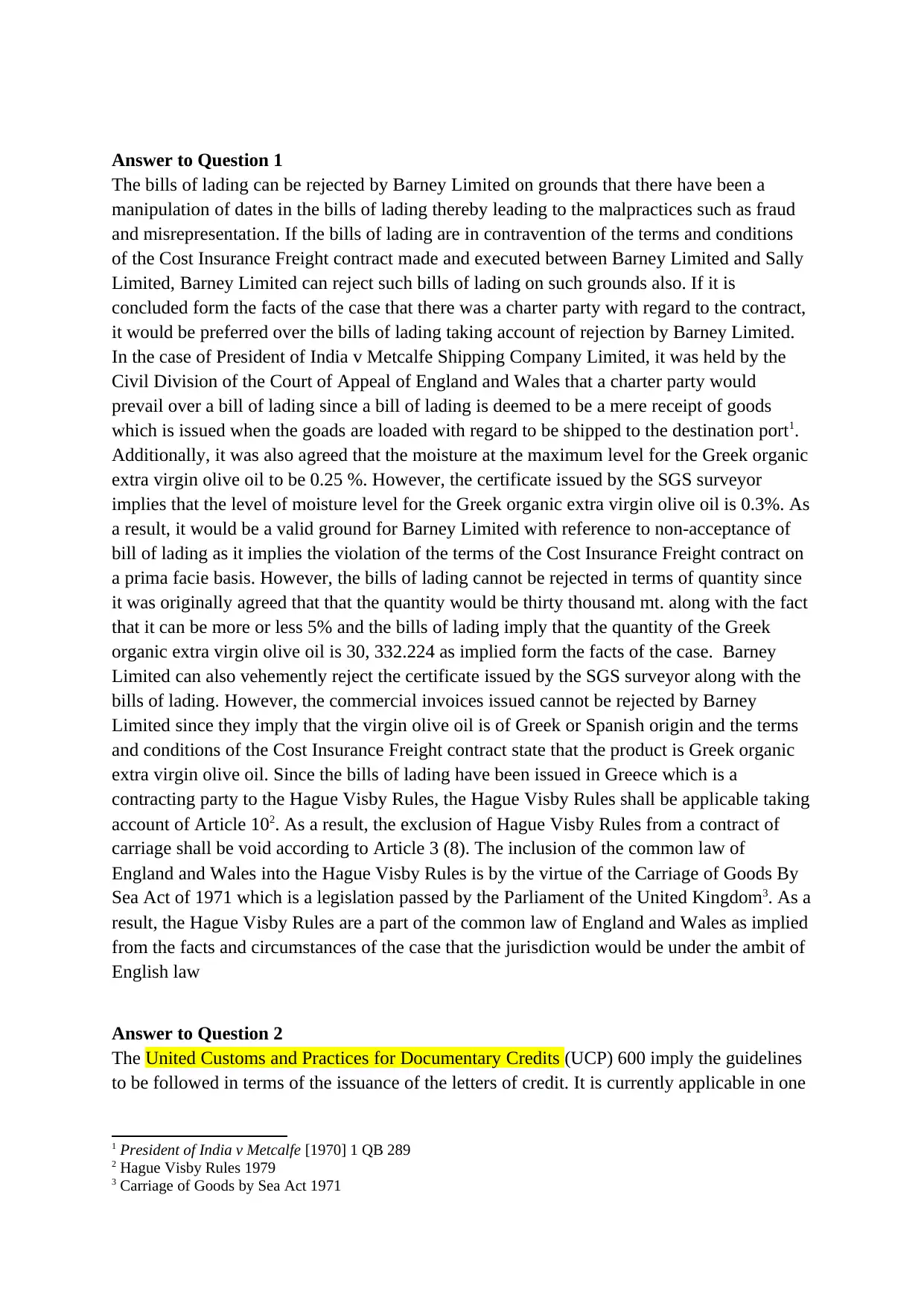
Answer to Question 1
The bills of lading can be rejected by Barney Limited on grounds that there have been a
manipulation of dates in the bills of lading thereby leading to the malpractices such as fraud
and misrepresentation. If the bills of lading are in contravention of the terms and conditions
of the Cost Insurance Freight contract made and executed between Barney Limited and Sally
Limited, Barney Limited can reject such bills of lading on such grounds also. If it is
concluded form the facts of the case that there was a charter party with regard to the contract,
it would be preferred over the bills of lading taking account of rejection by Barney Limited.
In the case of President of India v Metcalfe Shipping Company Limited, it was held by the
Civil Division of the Court of Appeal of England and Wales that a charter party would
prevail over a bill of lading since a bill of lading is deemed to be a mere receipt of goods
which is issued when the goads are loaded with regard to be shipped to the destination port1.
Additionally, it was also agreed that the moisture at the maximum level for the Greek organic
extra virgin olive oil to be 0.25 %. However, the certificate issued by the SGS surveyor
implies that the level of moisture level for the Greek organic extra virgin olive oil is 0.3%. As
a result, it would be a valid ground for Barney Limited with reference to non-acceptance of
bill of lading as it implies the violation of the terms of the Cost Insurance Freight contract on
a prima facie basis. However, the bills of lading cannot be rejected in terms of quantity since
it was originally agreed that that the quantity would be thirty thousand mt. along with the fact
that it can be more or less 5% and the bills of lading imply that the quantity of the Greek
organic extra virgin olive oil is 30, 332.224 as implied form the facts of the case. Barney
Limited can also vehemently reject the certificate issued by the SGS surveyor along with the
bills of lading. However, the commercial invoices issued cannot be rejected by Barney
Limited since they imply that the virgin olive oil is of Greek or Spanish origin and the terms
and conditions of the Cost Insurance Freight contract state that the product is Greek organic
extra virgin olive oil. Since the bills of lading have been issued in Greece which is a
contracting party to the Hague Visby Rules, the Hague Visby Rules shall be applicable taking
account of Article 102. As a result, the exclusion of Hague Visby Rules from a contract of
carriage shall be void according to Article 3 (8). The inclusion of the common law of
England and Wales into the Hague Visby Rules is by the virtue of the Carriage of Goods By
Sea Act of 1971 which is a legislation passed by the Parliament of the United Kingdom3. As a
result, the Hague Visby Rules are a part of the common law of England and Wales as implied
from the facts and circumstances of the case that the jurisdiction would be under the ambit of
English law
Answer to Question 2
The United Customs and Practices for Documentary Credits (UCP) 600 imply the guidelines
to be followed in terms of the issuance of the letters of credit. It is currently applicable in one
1 President of India v Metcalfe [1970] 1 QB 289
2 Hague Visby Rules 1979
3 Carriage of Goods by Sea Act 1971
The bills of lading can be rejected by Barney Limited on grounds that there have been a
manipulation of dates in the bills of lading thereby leading to the malpractices such as fraud
and misrepresentation. If the bills of lading are in contravention of the terms and conditions
of the Cost Insurance Freight contract made and executed between Barney Limited and Sally
Limited, Barney Limited can reject such bills of lading on such grounds also. If it is
concluded form the facts of the case that there was a charter party with regard to the contract,
it would be preferred over the bills of lading taking account of rejection by Barney Limited.
In the case of President of India v Metcalfe Shipping Company Limited, it was held by the
Civil Division of the Court of Appeal of England and Wales that a charter party would
prevail over a bill of lading since a bill of lading is deemed to be a mere receipt of goods
which is issued when the goads are loaded with regard to be shipped to the destination port1.
Additionally, it was also agreed that the moisture at the maximum level for the Greek organic
extra virgin olive oil to be 0.25 %. However, the certificate issued by the SGS surveyor
implies that the level of moisture level for the Greek organic extra virgin olive oil is 0.3%. As
a result, it would be a valid ground for Barney Limited with reference to non-acceptance of
bill of lading as it implies the violation of the terms of the Cost Insurance Freight contract on
a prima facie basis. However, the bills of lading cannot be rejected in terms of quantity since
it was originally agreed that that the quantity would be thirty thousand mt. along with the fact
that it can be more or less 5% and the bills of lading imply that the quantity of the Greek
organic extra virgin olive oil is 30, 332.224 as implied form the facts of the case. Barney
Limited can also vehemently reject the certificate issued by the SGS surveyor along with the
bills of lading. However, the commercial invoices issued cannot be rejected by Barney
Limited since they imply that the virgin olive oil is of Greek or Spanish origin and the terms
and conditions of the Cost Insurance Freight contract state that the product is Greek organic
extra virgin olive oil. Since the bills of lading have been issued in Greece which is a
contracting party to the Hague Visby Rules, the Hague Visby Rules shall be applicable taking
account of Article 102. As a result, the exclusion of Hague Visby Rules from a contract of
carriage shall be void according to Article 3 (8). The inclusion of the common law of
England and Wales into the Hague Visby Rules is by the virtue of the Carriage of Goods By
Sea Act of 1971 which is a legislation passed by the Parliament of the United Kingdom3. As a
result, the Hague Visby Rules are a part of the common law of England and Wales as implied
from the facts and circumstances of the case that the jurisdiction would be under the ambit of
English law
Answer to Question 2
The United Customs and Practices for Documentary Credits (UCP) 600 imply the guidelines
to be followed in terms of the issuance of the letters of credit. It is currently applicable in one
1 President of India v Metcalfe [1970] 1 QB 289
2 Hague Visby Rules 1979
3 Carriage of Goods by Sea Act 1971
⊘ This is a preview!⊘
Do you want full access?
Subscribe today to unlock all pages.

Trusted by 1+ million students worldwide
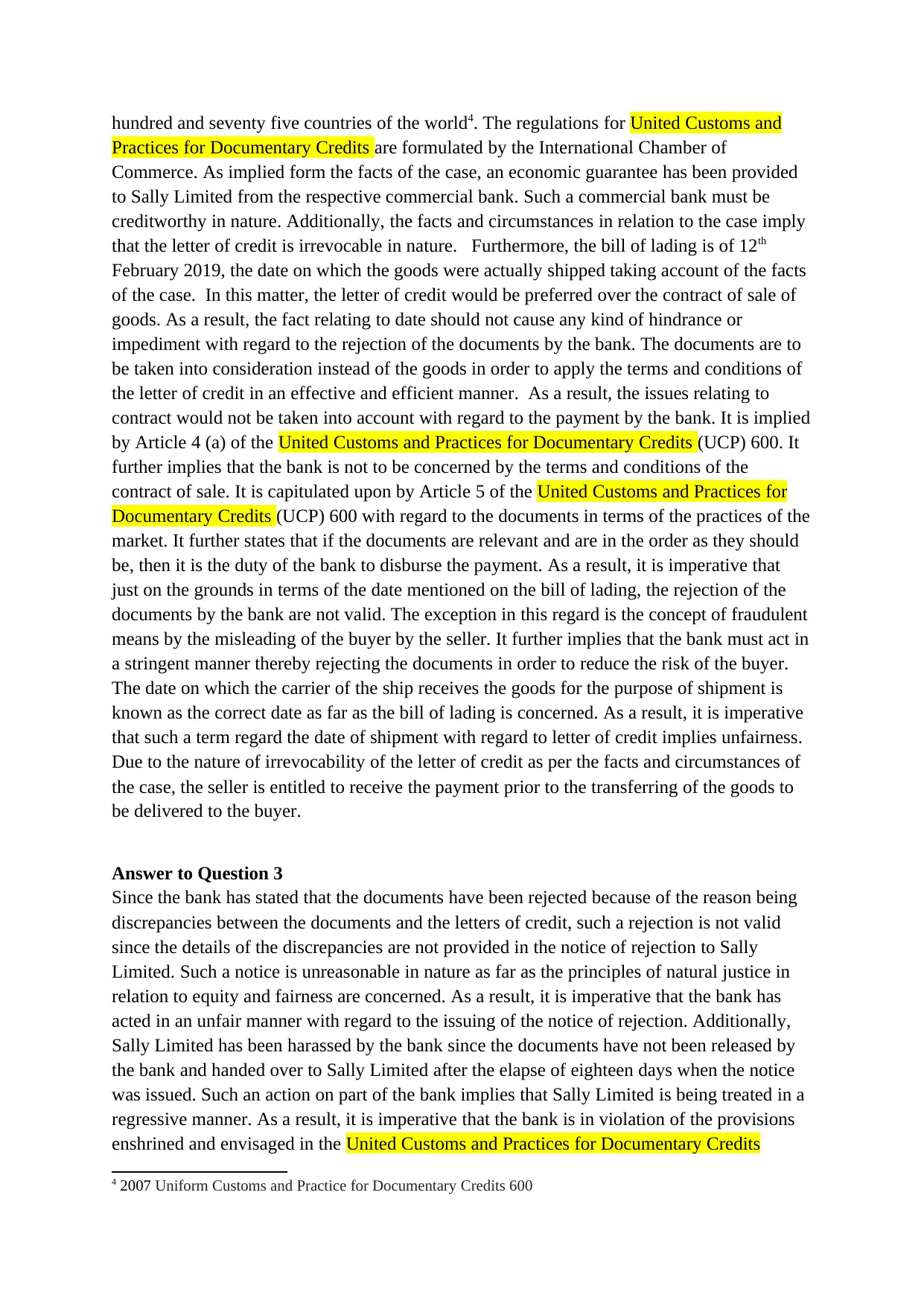
hundred and seventy five countries of the world4. The regulations for United Customs and
Practices for Documentary Credits are formulated by the International Chamber of
Commerce. As implied form the facts of the case, an economic guarantee has been provided
to Sally Limited from the respective commercial bank. Such a commercial bank must be
creditworthy in nature. Additionally, the facts and circumstances in relation to the case imply
that the letter of credit is irrevocable in nature. Furthermore, the bill of lading is of 12th
February 2019, the date on which the goods were actually shipped taking account of the facts
of the case. In this matter, the letter of credit would be preferred over the contract of sale of
goods. As a result, the fact relating to date should not cause any kind of hindrance or
impediment with regard to the rejection of the documents by the bank. The documents are to
be taken into consideration instead of the goods in order to apply the terms and conditions of
the letter of credit in an effective and efficient manner. As a result, the issues relating to
contract would not be taken into account with regard to the payment by the bank. It is implied
by Article 4 (a) of the United Customs and Practices for Documentary Credits (UCP) 600. It
further implies that the bank is not to be concerned by the terms and conditions of the
contract of sale. It is capitulated upon by Article 5 of the United Customs and Practices for
Documentary Credits (UCP) 600 with regard to the documents in terms of the practices of the
market. It further states that if the documents are relevant and are in the order as they should
be, then it is the duty of the bank to disburse the payment. As a result, it is imperative that
just on the grounds in terms of the date mentioned on the bill of lading, the rejection of the
documents by the bank are not valid. The exception in this regard is the concept of fraudulent
means by the misleading of the buyer by the seller. It further implies that the bank must act in
a stringent manner thereby rejecting the documents in order to reduce the risk of the buyer.
The date on which the carrier of the ship receives the goods for the purpose of shipment is
known as the correct date as far as the bill of lading is concerned. As a result, it is imperative
that such a term regard the date of shipment with regard to letter of credit implies unfairness.
Due to the nature of irrevocability of the letter of credit as per the facts and circumstances of
the case, the seller is entitled to receive the payment prior to the transferring of the goods to
be delivered to the buyer.
Answer to Question 3
Since the bank has stated that the documents have been rejected because of the reason being
discrepancies between the documents and the letters of credit, such a rejection is not valid
since the details of the discrepancies are not provided in the notice of rejection to Sally
Limited. Such a notice is unreasonable in nature as far as the principles of natural justice in
relation to equity and fairness are concerned. As a result, it is imperative that the bank has
acted in an unfair manner with regard to the issuing of the notice of rejection. Additionally,
Sally Limited has been harassed by the bank since the documents have not been released by
the bank and handed over to Sally Limited after the elapse of eighteen days when the notice
was issued. Such an action on part of the bank implies that Sally Limited is being treated in a
regressive manner. As a result, it is imperative that the bank is in violation of the provisions
enshrined and envisaged in the United Customs and Practices for Documentary Credits
4 2007 Uniform Customs and Practice for Documentary Credits 600
Practices for Documentary Credits are formulated by the International Chamber of
Commerce. As implied form the facts of the case, an economic guarantee has been provided
to Sally Limited from the respective commercial bank. Such a commercial bank must be
creditworthy in nature. Additionally, the facts and circumstances in relation to the case imply
that the letter of credit is irrevocable in nature. Furthermore, the bill of lading is of 12th
February 2019, the date on which the goods were actually shipped taking account of the facts
of the case. In this matter, the letter of credit would be preferred over the contract of sale of
goods. As a result, the fact relating to date should not cause any kind of hindrance or
impediment with regard to the rejection of the documents by the bank. The documents are to
be taken into consideration instead of the goods in order to apply the terms and conditions of
the letter of credit in an effective and efficient manner. As a result, the issues relating to
contract would not be taken into account with regard to the payment by the bank. It is implied
by Article 4 (a) of the United Customs and Practices for Documentary Credits (UCP) 600. It
further implies that the bank is not to be concerned by the terms and conditions of the
contract of sale. It is capitulated upon by Article 5 of the United Customs and Practices for
Documentary Credits (UCP) 600 with regard to the documents in terms of the practices of the
market. It further states that if the documents are relevant and are in the order as they should
be, then it is the duty of the bank to disburse the payment. As a result, it is imperative that
just on the grounds in terms of the date mentioned on the bill of lading, the rejection of the
documents by the bank are not valid. The exception in this regard is the concept of fraudulent
means by the misleading of the buyer by the seller. It further implies that the bank must act in
a stringent manner thereby rejecting the documents in order to reduce the risk of the buyer.
The date on which the carrier of the ship receives the goods for the purpose of shipment is
known as the correct date as far as the bill of lading is concerned. As a result, it is imperative
that such a term regard the date of shipment with regard to letter of credit implies unfairness.
Due to the nature of irrevocability of the letter of credit as per the facts and circumstances of
the case, the seller is entitled to receive the payment prior to the transferring of the goods to
be delivered to the buyer.
Answer to Question 3
Since the bank has stated that the documents have been rejected because of the reason being
discrepancies between the documents and the letters of credit, such a rejection is not valid
since the details of the discrepancies are not provided in the notice of rejection to Sally
Limited. Such a notice is unreasonable in nature as far as the principles of natural justice in
relation to equity and fairness are concerned. As a result, it is imperative that the bank has
acted in an unfair manner with regard to the issuing of the notice of rejection. Additionally,
Sally Limited has been harassed by the bank since the documents have not been released by
the bank and handed over to Sally Limited after the elapse of eighteen days when the notice
was issued. Such an action on part of the bank implies that Sally Limited is being treated in a
regressive manner. As a result, it is imperative that the bank is in violation of the provisions
enshrined and envisaged in the United Customs and Practices for Documentary Credits
4 2007 Uniform Customs and Practice for Documentary Credits 600
Paraphrase This Document
Need a fresh take? Get an instant paraphrase of this document with our AI Paraphraser
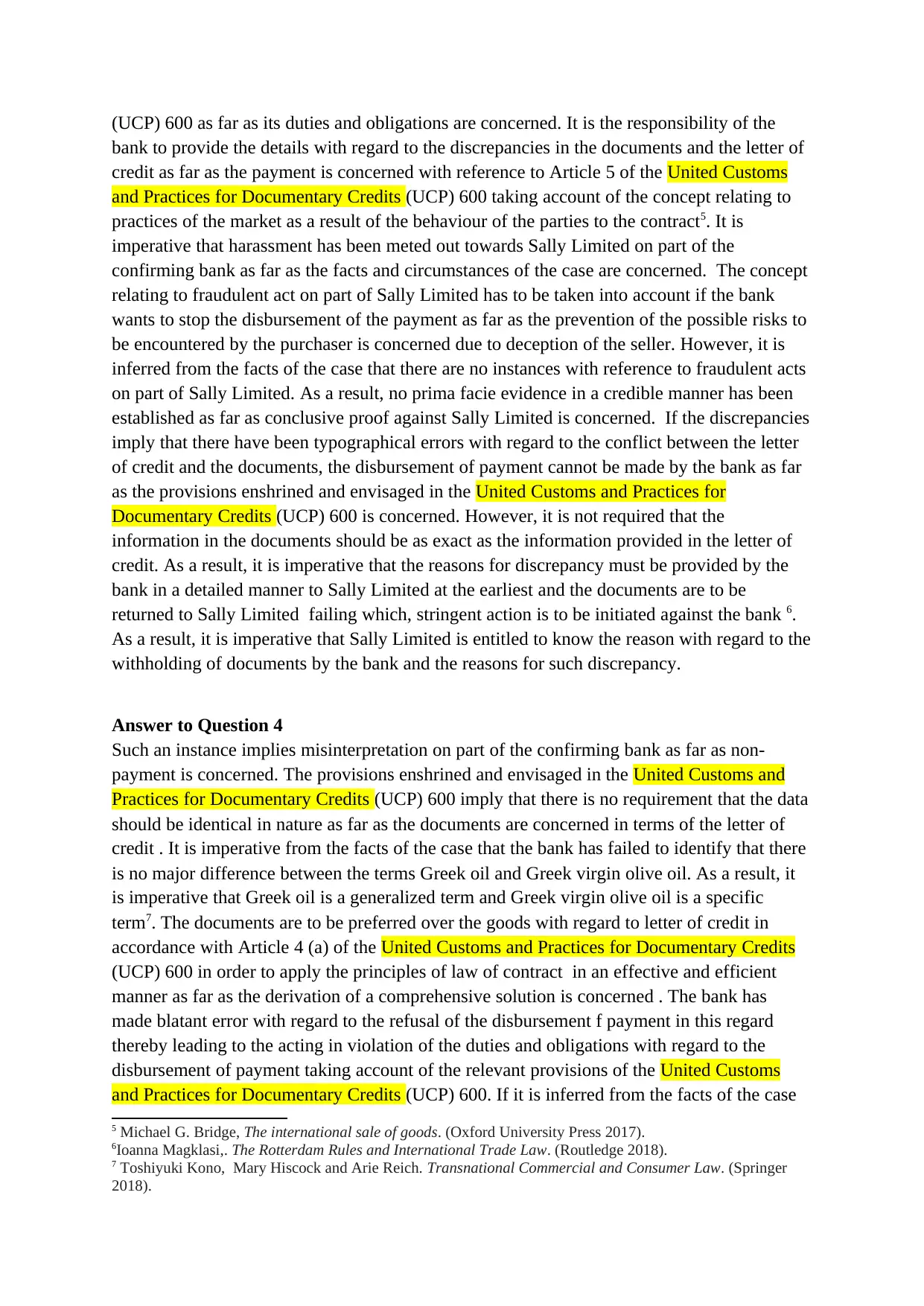
(UCP) 600 as far as its duties and obligations are concerned. It is the responsibility of the
bank to provide the details with regard to the discrepancies in the documents and the letter of
credit as far as the payment is concerned with reference to Article 5 of the United Customs
and Practices for Documentary Credits (UCP) 600 taking account of the concept relating to
practices of the market as a result of the behaviour of the parties to the contract5. It is
imperative that harassment has been meted out towards Sally Limited on part of the
confirming bank as far as the facts and circumstances of the case are concerned. The concept
relating to fraudulent act on part of Sally Limited has to be taken into account if the bank
wants to stop the disbursement of the payment as far as the prevention of the possible risks to
be encountered by the purchaser is concerned due to deception of the seller. However, it is
inferred from the facts of the case that there are no instances with reference to fraudulent acts
on part of Sally Limited. As a result, no prima facie evidence in a credible manner has been
established as far as conclusive proof against Sally Limited is concerned. If the discrepancies
imply that there have been typographical errors with regard to the conflict between the letter
of credit and the documents, the disbursement of payment cannot be made by the bank as far
as the provisions enshrined and envisaged in the United Customs and Practices for
Documentary Credits (UCP) 600 is concerned. However, it is not required that the
information in the documents should be as exact as the information provided in the letter of
credit. As a result, it is imperative that the reasons for discrepancy must be provided by the
bank in a detailed manner to Sally Limited at the earliest and the documents are to be
returned to Sally Limited failing which, stringent action is to be initiated against the bank 6.
As a result, it is imperative that Sally Limited is entitled to know the reason with regard to the
withholding of documents by the bank and the reasons for such discrepancy.
Answer to Question 4
Such an instance implies misinterpretation on part of the confirming bank as far as non-
payment is concerned. The provisions enshrined and envisaged in the United Customs and
Practices for Documentary Credits (UCP) 600 imply that there is no requirement that the data
should be identical in nature as far as the documents are concerned in terms of the letter of
credit . It is imperative from the facts of the case that the bank has failed to identify that there
is no major difference between the terms Greek oil and Greek virgin olive oil. As a result, it
is imperative that Greek oil is a generalized term and Greek virgin olive oil is a specific
term7. The documents are to be preferred over the goods with regard to letter of credit in
accordance with Article 4 (a) of the United Customs and Practices for Documentary Credits
(UCP) 600 in order to apply the principles of law of contract in an effective and efficient
manner as far as the derivation of a comprehensive solution is concerned . The bank has
made blatant error with regard to the refusal of the disbursement f payment in this regard
thereby leading to the acting in violation of the duties and obligations with regard to the
disbursement of payment taking account of the relevant provisions of the United Customs
and Practices for Documentary Credits (UCP) 600. If it is inferred from the facts of the case
5 Michael G. Bridge, The international sale of goods. (Oxford University Press 2017).
6Ioanna Magklasi,. The Rotterdam Rules and International Trade Law. (Routledge 2018).
7 Toshiyuki Kono, Mary Hiscock and Arie Reich. Transnational Commercial and Consumer Law. (Springer
2018).
bank to provide the details with regard to the discrepancies in the documents and the letter of
credit as far as the payment is concerned with reference to Article 5 of the United Customs
and Practices for Documentary Credits (UCP) 600 taking account of the concept relating to
practices of the market as a result of the behaviour of the parties to the contract5. It is
imperative that harassment has been meted out towards Sally Limited on part of the
confirming bank as far as the facts and circumstances of the case are concerned. The concept
relating to fraudulent act on part of Sally Limited has to be taken into account if the bank
wants to stop the disbursement of the payment as far as the prevention of the possible risks to
be encountered by the purchaser is concerned due to deception of the seller. However, it is
inferred from the facts of the case that there are no instances with reference to fraudulent acts
on part of Sally Limited. As a result, no prima facie evidence in a credible manner has been
established as far as conclusive proof against Sally Limited is concerned. If the discrepancies
imply that there have been typographical errors with regard to the conflict between the letter
of credit and the documents, the disbursement of payment cannot be made by the bank as far
as the provisions enshrined and envisaged in the United Customs and Practices for
Documentary Credits (UCP) 600 is concerned. However, it is not required that the
information in the documents should be as exact as the information provided in the letter of
credit. As a result, it is imperative that the reasons for discrepancy must be provided by the
bank in a detailed manner to Sally Limited at the earliest and the documents are to be
returned to Sally Limited failing which, stringent action is to be initiated against the bank 6.
As a result, it is imperative that Sally Limited is entitled to know the reason with regard to the
withholding of documents by the bank and the reasons for such discrepancy.
Answer to Question 4
Such an instance implies misinterpretation on part of the confirming bank as far as non-
payment is concerned. The provisions enshrined and envisaged in the United Customs and
Practices for Documentary Credits (UCP) 600 imply that there is no requirement that the data
should be identical in nature as far as the documents are concerned in terms of the letter of
credit . It is imperative from the facts of the case that the bank has failed to identify that there
is no major difference between the terms Greek oil and Greek virgin olive oil. As a result, it
is imperative that Greek oil is a generalized term and Greek virgin olive oil is a specific
term7. The documents are to be preferred over the goods with regard to letter of credit in
accordance with Article 4 (a) of the United Customs and Practices for Documentary Credits
(UCP) 600 in order to apply the principles of law of contract in an effective and efficient
manner as far as the derivation of a comprehensive solution is concerned . The bank has
made blatant error with regard to the refusal of the disbursement f payment in this regard
thereby leading to the acting in violation of the duties and obligations with regard to the
disbursement of payment taking account of the relevant provisions of the United Customs
and Practices for Documentary Credits (UCP) 600. If it is inferred from the facts of the case
5 Michael G. Bridge, The international sale of goods. (Oxford University Press 2017).
6Ioanna Magklasi,. The Rotterdam Rules and International Trade Law. (Routledge 2018).
7 Toshiyuki Kono, Mary Hiscock and Arie Reich. Transnational Commercial and Consumer Law. (Springer
2018).
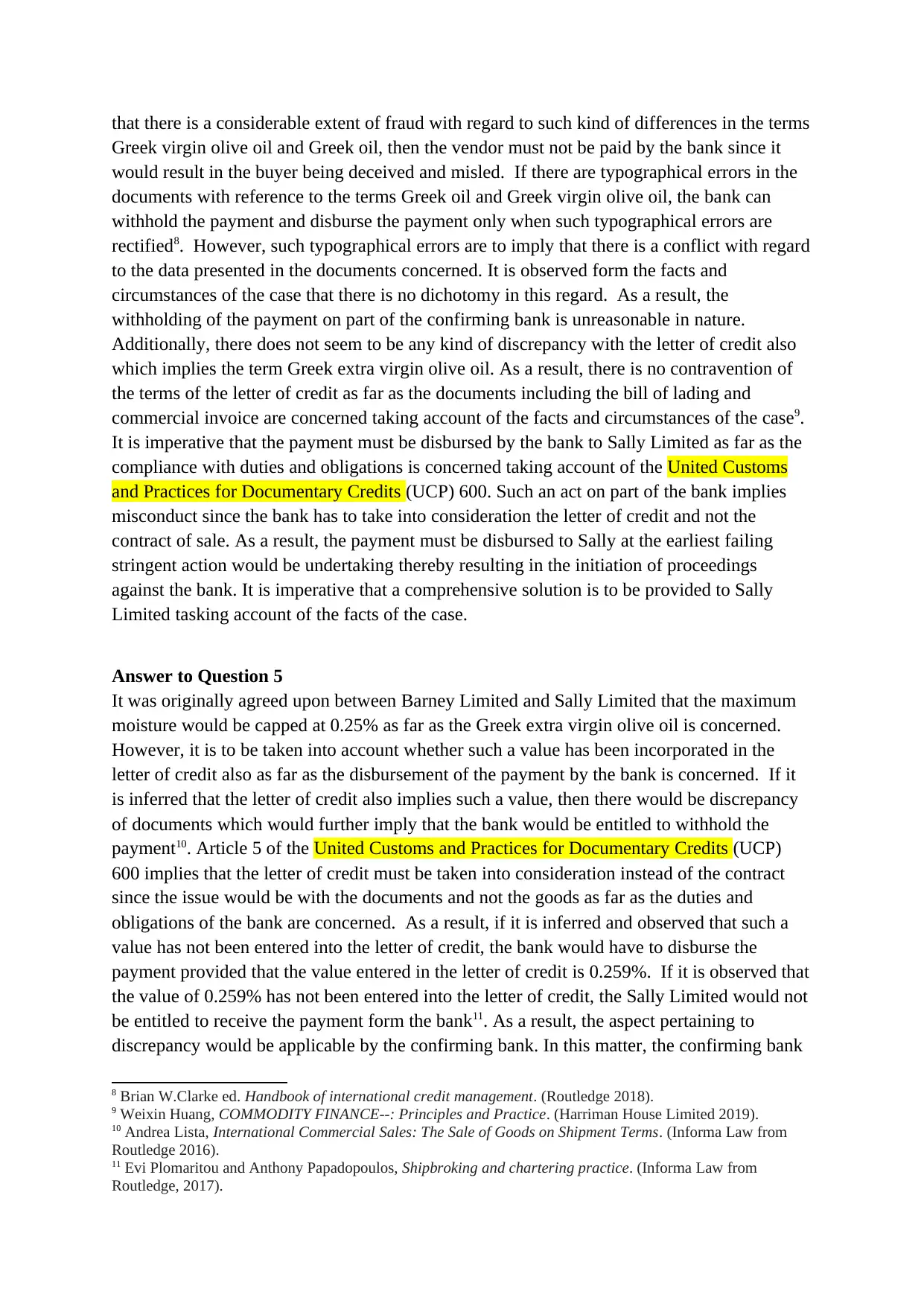
that there is a considerable extent of fraud with regard to such kind of differences in the terms
Greek virgin olive oil and Greek oil, then the vendor must not be paid by the bank since it
would result in the buyer being deceived and misled. If there are typographical errors in the
documents with reference to the terms Greek oil and Greek virgin olive oil, the bank can
withhold the payment and disburse the payment only when such typographical errors are
rectified8. However, such typographical errors are to imply that there is a conflict with regard
to the data presented in the documents concerned. It is observed form the facts and
circumstances of the case that there is no dichotomy in this regard. As a result, the
withholding of the payment on part of the confirming bank is unreasonable in nature.
Additionally, there does not seem to be any kind of discrepancy with the letter of credit also
which implies the term Greek extra virgin olive oil. As a result, there is no contravention of
the terms of the letter of credit as far as the documents including the bill of lading and
commercial invoice are concerned taking account of the facts and circumstances of the case9.
It is imperative that the payment must be disbursed by the bank to Sally Limited as far as the
compliance with duties and obligations is concerned taking account of the United Customs
and Practices for Documentary Credits (UCP) 600. Such an act on part of the bank implies
misconduct since the bank has to take into consideration the letter of credit and not the
contract of sale. As a result, the payment must be disbursed to Sally at the earliest failing
stringent action would be undertaking thereby resulting in the initiation of proceedings
against the bank. It is imperative that a comprehensive solution is to be provided to Sally
Limited tasking account of the facts of the case.
Answer to Question 5
It was originally agreed upon between Barney Limited and Sally Limited that the maximum
moisture would be capped at 0.25% as far as the Greek extra virgin olive oil is concerned.
However, it is to be taken into account whether such a value has been incorporated in the
letter of credit also as far as the disbursement of the payment by the bank is concerned. If it
is inferred that the letter of credit also implies such a value, then there would be discrepancy
of documents which would further imply that the bank would be entitled to withhold the
payment10. Article 5 of the United Customs and Practices for Documentary Credits (UCP)
600 implies that the letter of credit must be taken into consideration instead of the contract
since the issue would be with the documents and not the goods as far as the duties and
obligations of the bank are concerned. As a result, if it is inferred and observed that such a
value has not been entered into the letter of credit, the bank would have to disburse the
payment provided that the value entered in the letter of credit is 0.259%. If it is observed that
the value of 0.259% has not been entered into the letter of credit, the Sally Limited would not
be entitled to receive the payment form the bank11. As a result, the aspect pertaining to
discrepancy would be applicable by the confirming bank. In this matter, the confirming bank
8 Brian W.Clarke ed. Handbook of international credit management. (Routledge 2018).
9 Weixin Huang, COMMODITY FINANCE--: Principles and Practice. (Harriman House Limited 2019).
10 Andrea Lista, International Commercial Sales: The Sale of Goods on Shipment Terms. (Informa Law from
Routledge 2016).
11 Evi Plomaritou and Anthony Papadopoulos, Shipbroking and chartering practice. (Informa Law from
Routledge, 2017).
Greek virgin olive oil and Greek oil, then the vendor must not be paid by the bank since it
would result in the buyer being deceived and misled. If there are typographical errors in the
documents with reference to the terms Greek oil and Greek virgin olive oil, the bank can
withhold the payment and disburse the payment only when such typographical errors are
rectified8. However, such typographical errors are to imply that there is a conflict with regard
to the data presented in the documents concerned. It is observed form the facts and
circumstances of the case that there is no dichotomy in this regard. As a result, the
withholding of the payment on part of the confirming bank is unreasonable in nature.
Additionally, there does not seem to be any kind of discrepancy with the letter of credit also
which implies the term Greek extra virgin olive oil. As a result, there is no contravention of
the terms of the letter of credit as far as the documents including the bill of lading and
commercial invoice are concerned taking account of the facts and circumstances of the case9.
It is imperative that the payment must be disbursed by the bank to Sally Limited as far as the
compliance with duties and obligations is concerned taking account of the United Customs
and Practices for Documentary Credits (UCP) 600. Such an act on part of the bank implies
misconduct since the bank has to take into consideration the letter of credit and not the
contract of sale. As a result, the payment must be disbursed to Sally at the earliest failing
stringent action would be undertaking thereby resulting in the initiation of proceedings
against the bank. It is imperative that a comprehensive solution is to be provided to Sally
Limited tasking account of the facts of the case.
Answer to Question 5
It was originally agreed upon between Barney Limited and Sally Limited that the maximum
moisture would be capped at 0.25% as far as the Greek extra virgin olive oil is concerned.
However, it is to be taken into account whether such a value has been incorporated in the
letter of credit also as far as the disbursement of the payment by the bank is concerned. If it
is inferred that the letter of credit also implies such a value, then there would be discrepancy
of documents which would further imply that the bank would be entitled to withhold the
payment10. Article 5 of the United Customs and Practices for Documentary Credits (UCP)
600 implies that the letter of credit must be taken into consideration instead of the contract
since the issue would be with the documents and not the goods as far as the duties and
obligations of the bank are concerned. As a result, if it is inferred and observed that such a
value has not been entered into the letter of credit, the bank would have to disburse the
payment provided that the value entered in the letter of credit is 0.259%. If it is observed that
the value of 0.259% has not been entered into the letter of credit, the Sally Limited would not
be entitled to receive the payment form the bank11. As a result, the aspect pertaining to
discrepancy would be applicable by the confirming bank. In this matter, the confirming bank
8 Brian W.Clarke ed. Handbook of international credit management. (Routledge 2018).
9 Weixin Huang, COMMODITY FINANCE--: Principles and Practice. (Harriman House Limited 2019).
10 Andrea Lista, International Commercial Sales: The Sale of Goods on Shipment Terms. (Informa Law from
Routledge 2016).
11 Evi Plomaritou and Anthony Papadopoulos, Shipbroking and chartering practice. (Informa Law from
Routledge, 2017).
⊘ This is a preview!⊘
Do you want full access?
Subscribe today to unlock all pages.

Trusted by 1+ million students worldwide
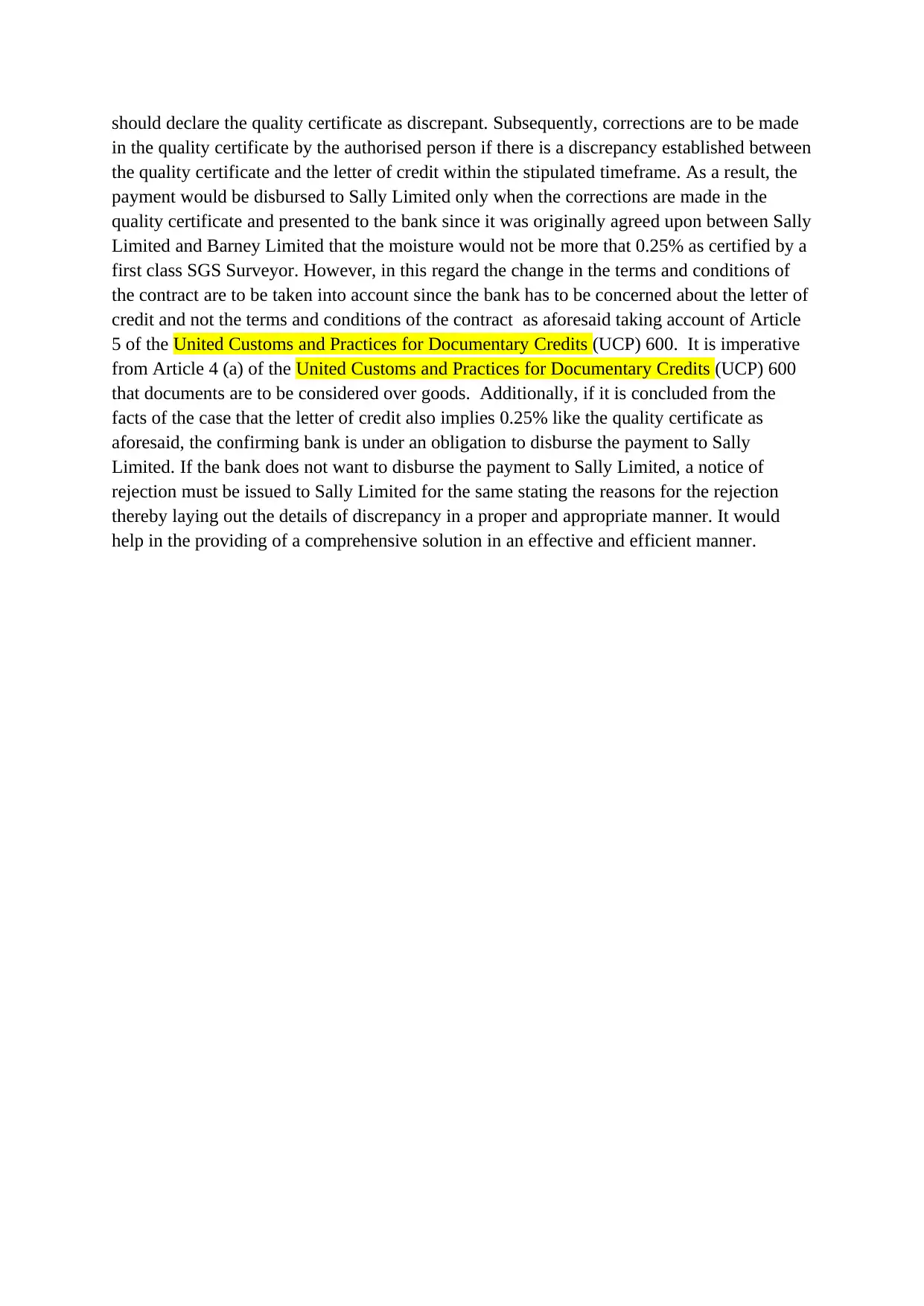
should declare the quality certificate as discrepant. Subsequently, corrections are to be made
in the quality certificate by the authorised person if there is a discrepancy established between
the quality certificate and the letter of credit within the stipulated timeframe. As a result, the
payment would be disbursed to Sally Limited only when the corrections are made in the
quality certificate and presented to the bank since it was originally agreed upon between Sally
Limited and Barney Limited that the moisture would not be more that 0.25% as certified by a
first class SGS Surveyor. However, in this regard the change in the terms and conditions of
the contract are to be taken into account since the bank has to be concerned about the letter of
credit and not the terms and conditions of the contract as aforesaid taking account of Article
5 of the United Customs and Practices for Documentary Credits (UCP) 600. It is imperative
from Article 4 (a) of the United Customs and Practices for Documentary Credits (UCP) 600
that documents are to be considered over goods. Additionally, if it is concluded from the
facts of the case that the letter of credit also implies 0.25% like the quality certificate as
aforesaid, the confirming bank is under an obligation to disburse the payment to Sally
Limited. If the bank does not want to disburse the payment to Sally Limited, a notice of
rejection must be issued to Sally Limited for the same stating the reasons for the rejection
thereby laying out the details of discrepancy in a proper and appropriate manner. It would
help in the providing of a comprehensive solution in an effective and efficient manner.
in the quality certificate by the authorised person if there is a discrepancy established between
the quality certificate and the letter of credit within the stipulated timeframe. As a result, the
payment would be disbursed to Sally Limited only when the corrections are made in the
quality certificate and presented to the bank since it was originally agreed upon between Sally
Limited and Barney Limited that the moisture would not be more that 0.25% as certified by a
first class SGS Surveyor. However, in this regard the change in the terms and conditions of
the contract are to be taken into account since the bank has to be concerned about the letter of
credit and not the terms and conditions of the contract as aforesaid taking account of Article
5 of the United Customs and Practices for Documentary Credits (UCP) 600. It is imperative
from Article 4 (a) of the United Customs and Practices for Documentary Credits (UCP) 600
that documents are to be considered over goods. Additionally, if it is concluded from the
facts of the case that the letter of credit also implies 0.25% like the quality certificate as
aforesaid, the confirming bank is under an obligation to disburse the payment to Sally
Limited. If the bank does not want to disburse the payment to Sally Limited, a notice of
rejection must be issued to Sally Limited for the same stating the reasons for the rejection
thereby laying out the details of discrepancy in a proper and appropriate manner. It would
help in the providing of a comprehensive solution in an effective and efficient manner.
Paraphrase This Document
Need a fresh take? Get an instant paraphrase of this document with our AI Paraphraser
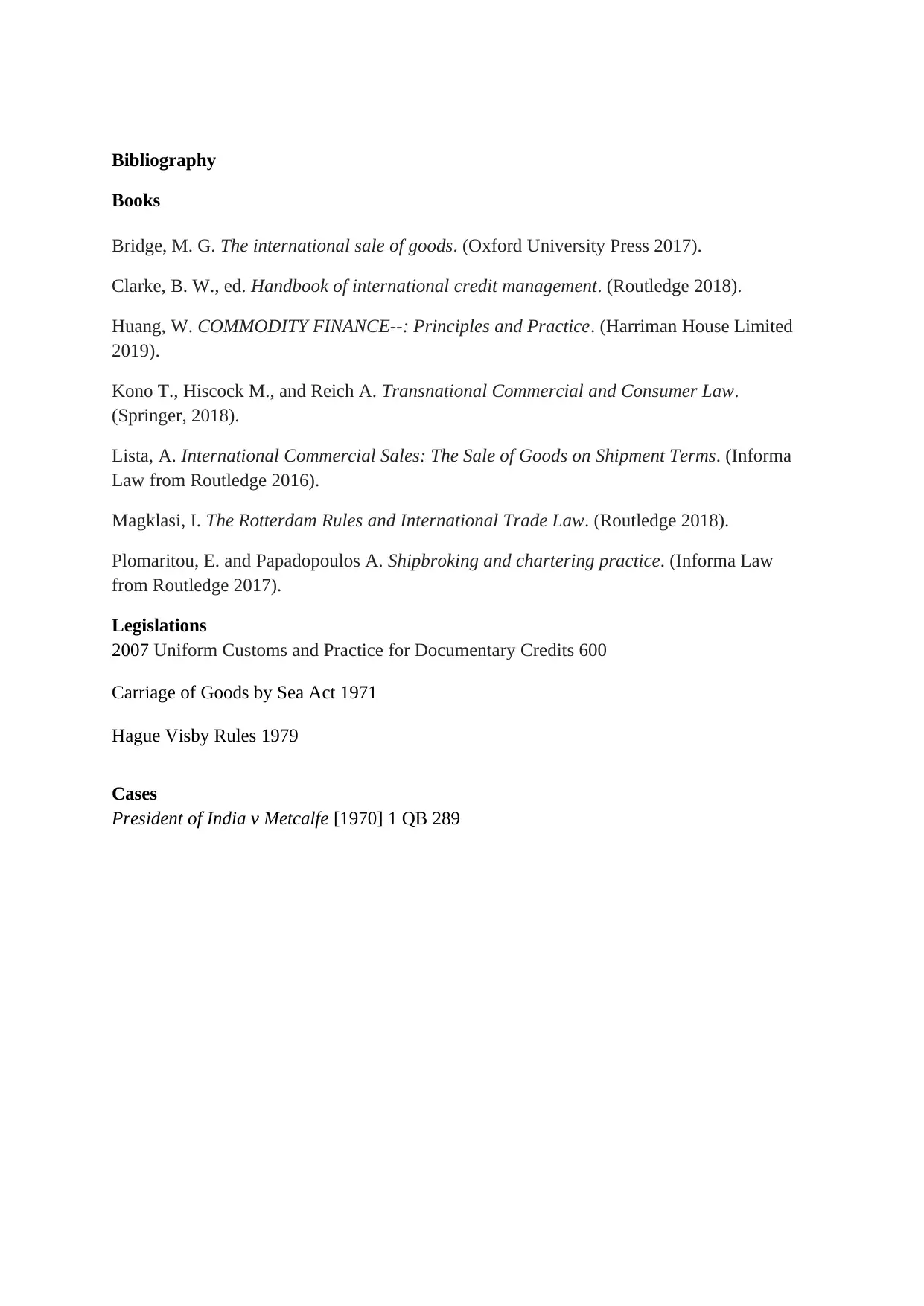
Bibliography
Books
Bridge, M. G. The international sale of goods. (Oxford University Press 2017).
Clarke, B. W., ed. Handbook of international credit management. (Routledge 2018).
Huang, W. COMMODITY FINANCE--: Principles and Practice. (Harriman House Limited
2019).
Kono T., Hiscock M., and Reich A. Transnational Commercial and Consumer Law.
(Springer, 2018).
Lista, A. International Commercial Sales: The Sale of Goods on Shipment Terms. (Informa
Law from Routledge 2016).
Magklasi, I. The Rotterdam Rules and International Trade Law. (Routledge 2018).
Plomaritou, E. and Papadopoulos A. Shipbroking and chartering practice. (Informa Law
from Routledge 2017).
Legislations
2007 Uniform Customs and Practice for Documentary Credits 600
Carriage of Goods by Sea Act 1971
Hague Visby Rules 1979
Cases
President of India v Metcalfe [1970] 1 QB 289
Books
Bridge, M. G. The international sale of goods. (Oxford University Press 2017).
Clarke, B. W., ed. Handbook of international credit management. (Routledge 2018).
Huang, W. COMMODITY FINANCE--: Principles and Practice. (Harriman House Limited
2019).
Kono T., Hiscock M., and Reich A. Transnational Commercial and Consumer Law.
(Springer, 2018).
Lista, A. International Commercial Sales: The Sale of Goods on Shipment Terms. (Informa
Law from Routledge 2016).
Magklasi, I. The Rotterdam Rules and International Trade Law. (Routledge 2018).
Plomaritou, E. and Papadopoulos A. Shipbroking and chartering practice. (Informa Law
from Routledge 2017).
Legislations
2007 Uniform Customs and Practice for Documentary Credits 600
Carriage of Goods by Sea Act 1971
Hague Visby Rules 1979
Cases
President of India v Metcalfe [1970] 1 QB 289
1 out of 8
Your All-in-One AI-Powered Toolkit for Academic Success.
+13062052269
info@desklib.com
Available 24*7 on WhatsApp / Email
![[object Object]](/_next/static/media/star-bottom.7253800d.svg)
Unlock your academic potential
Copyright © 2020–2026 A2Z Services. All Rights Reserved. Developed and managed by ZUCOL.